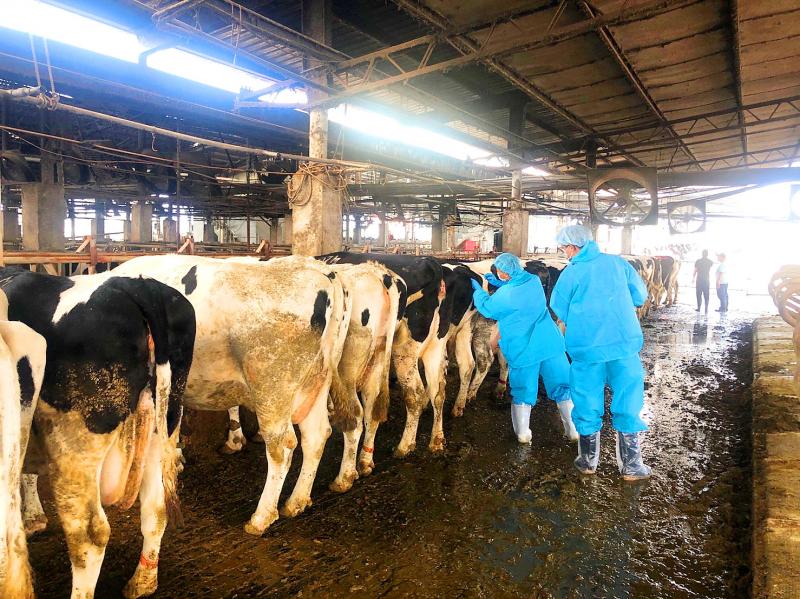All cattle in the nation are to be vaccinated against lumpy skin disease by next week, the Council of Agriculture (COA) said on Monday.
Eight beef cattle infected with the disease were discovered on a farm in New Taipei City’s Linkou District (林口) on Thursday — a first for Taiwan proper.
Council minister Chen Chi-chung (陳吉仲) at the time said that the disease likely spread from Kinmen County or China.

Photo: Tsai Tsung-hsun, Taipei Times
To prevent further transmission, the council began vaccinating all cattle in Taiwan, and as of Sunday, all cattle raised in areas north of Miaoli County had been inoculated, council Deputy Minister Huang Chin-cheng (黃金城) said on Monday.
Vaccinations in Taichung and Changhua County were to begin yesterday, he said.
About 180,000 vaccine doses are to arrive tomorrow, which would allow all cattle in the nation, including those on the outlying islands, to be vaccinated against the disease by next week, Huang said, expressing confidence that the outbreak can be contained.
An inspection conducted in the past few days of 160,815 cattle at 1,623 farms showed them to be in good health, the council said in a statement on Sunday.
The annual output value of the nation’s beef and dairy cattle industry is about NT$14 billion (US$497.5 million), the council said.
Lumpy skin disease is a viral disease that affects cattle and buffalo.
It is spread by flies and mosquitoes, and infected animals develop a fever and nodules on their skin. It can be fatal.
It was detected for the first time in Taiwan in the island county of Kinmen in July last year, which led to the vaccination of all of the roughly 6,200 cattle there.

Eight restaurants in Taiwan yesterday secured a one-star rating from the Michelin Guide Taiwan for the first time, while three one-star restaurants from last year’s edition were promoted to two stars. Forty-three restaurants were awarded one star this year, including 34 in Taipei, five in Taichung and four in Kaohsiung. Hosu (好嶼), Chuan Ya (川雅), Sushi Kajin (鮨嘉仁), aMaze (心宴), La Vie by Thomas Buhner, Yuan Yi (元一) and Frassi in Taipei and Front House (方蒔) in Kaohsiung received a one-star rating for the first time. Hosu is known for innovative Taiwanese dishes, while Chuan Ya serves Sichuan cuisine and aMaze specializes

STATS: Taiwan’s average life expectancy of 80.77 years was lower than that of Japan, Singapore and South Korea, but higher than in China, Malaysia and Indonesia Taiwan’s average life expectancy last year increased to 80.77 years, but was still not back to its pre-COVID-19 pandemic peak of 81.32 years in 2020, the Ministry of the Interior said yesterday. The average life expectancy last year increased the 0.54 years from 2023, the ministry said in a statement. For men and women, the average life expectancy last year was 77.42 years and 84.30 years respectively, up 0.48 years and 0.56 years from the previous year. Taiwan’s average life expectancy peaked at 81.32 years in 2020, as the nation was relatively unaffected by the pandemic that year. The metric

Taitung County is to launch charter flights to Malaysia at the end of this year, after setting up flights to Vietnam and Thailand, the Taitung County Government said yesterday. The new charter flight services, provided by low-cost carrier Batik Air Malaysia, would be part of five-day tour packages for visits to Taitung County or Malaysia. The Batik Air charter flight, with about 200 seats, would take Malaysian tourists to Taitung on Dec. 30 and then at 12:35pm return to Kuala Lumpur with Taiwanese tourists. Another charter flight would bring the Taiwanese home on Jan. 3 next year, arriving at 5:30pm, before taking the

Taiwan High Speed Rail Corp. (THSRC) plans to ease strained capacity during peak hours by introducing new fare rules restricting passengers traveling without reserved seats in 2026, company Chairman Shih Che (史哲) said Wednesday. THSRC needs to tackle its capacity issue because there have been several occasions where passengers holding tickets with reserved seats did not make it onto their train in stations packed with individuals traveling without a reserved seat, Shih told reporters in a joint interview in Taipei. Non-reserved seats allow travelers maximum flexibility, but it has led to issues relating to quality of service and safety concerns, especially during